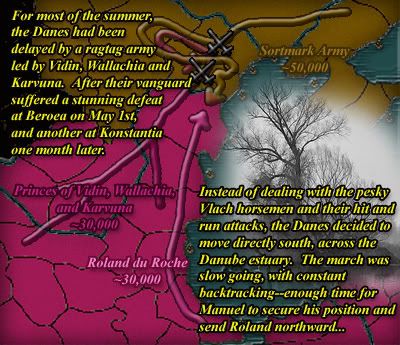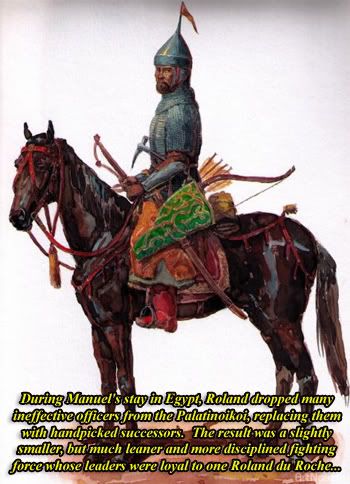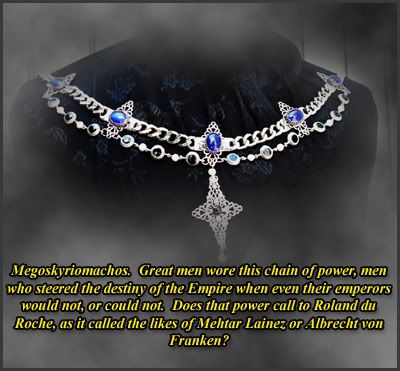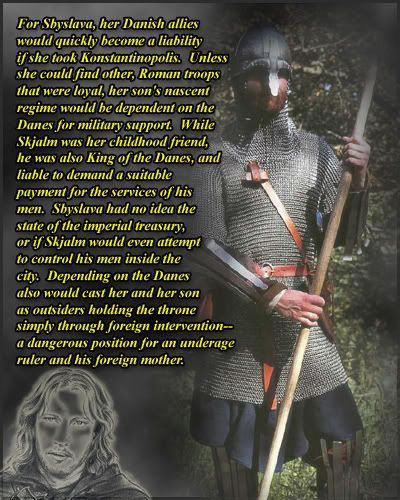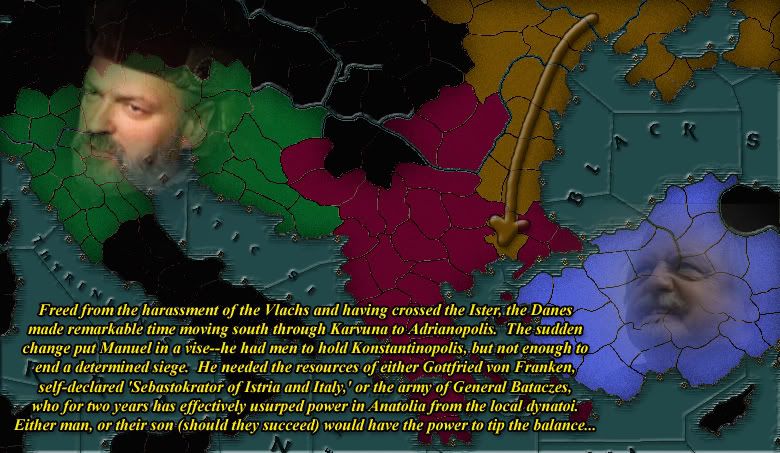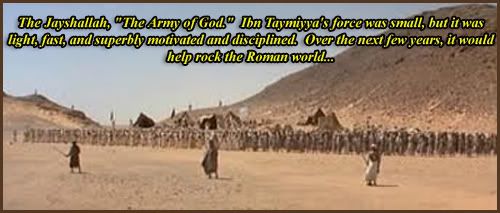“The littlest drop of water, if given time to fall to the place God has ordained, can ripple and grow into a great tidal wave of change.” - Guillaume d'Ockham
October 1st, 1303
Roland du Roche hated waiting.
Nervously, the
Megoskyriomachos glanced around the tent he now sat inside—flags of Rus lords, Mongol
khans and all other manner of minor nobility the Danes of the North had subdued hung at every quarter. If it was an attempt to impress him, the attempt fell flat. Du Roche had been to the Octagon, he'd seen the banners from the Thomasine Emperors on back—Seljuk
Shahanshah's, Christian Kings—all far more impressive than a banner from a
boyar of Beleozero.
Over his shoulder, through the tent flap he'd walked through minutes before, Roland could see the twinkling campfires of his own army, 30,000 strong. The
Palatinoikoi were the core, buffered with the remaining
thematakoi from the shattered Balkans—slingers, peltasts, light spearmen, troops that rounded out his heavy ranks. The
Palatinoikoi, though, were the heart of this army. They were good, solid men, handpicked by Roland himself while Manuel was in Egypt, and loyal to the core. Du Roche was sure they would fight to the last man on his orders, if needbe.
He hoped, however, it wouldn't come to that end.
The Princes of Vidin, Karvuna and Wallachia owed their positions, and, if du Roche's agents were correct, their lives to the timely intervention of the new
Megas Komnenos during the final days of Andronikos
Apokathistos. Collectively they had fewer than 10,000 armed retainers, but they knew the terrain along the Pruth Valley like they knew their own hands—and the large army of the Dowager Empress had to make its entrance into imperial territory proper by either crossing the Pruth, or making for the Ister estuary, a morass of bogs, swamps and mud. For most of the spring, the Princes collectively frustrated crossing attempt after crossing attempt, until in July the Varangians angrily lunged south, intending to force their way across the moors of the greatest river in the Balkans.
To be honest, it'd taken a feat of military engineering for the Danish army to even be here, outside of Constantia, preparing to cross the last of the fingers of the great river delta, even this late in the year. Du Roche's master had reasoned that the marshes and mudflats would either swallow the Danish horde, or whittle it down to ineffectiveness. The men that du Roche had seen across the river earlier in the day had looked hale and hearty, but the
Megoskyriomachos reasoned that his counterpart could be taking great pains to not reveal how many of her Varangians were sick or ill-fed.
Maybe that's why she'd insisted they meet here, in the middle span of the lone bridge across this last stream of the river for miles in the dead of night.
There were other, more nefarious possibilities as well—du Roche had brought with him his personal bodyguard, 20 of the fiercest Mongols money could buy. As he twiddled his thumbs, two of them nervously checked the entirety of the tent once more. Their comrades had taken positions up and down the bridge in preparation, and Roland was sure Kitburqa and Ogedei had gone ahead with their scheme to clamber
under part of the bridge, ready to climb up and surprise any would be assassins. As he sat down and sighed, however, Roland was sure none of those preparations would be necessary. Sbyslava didn't know the ground this far south, and he would be his life that she had no eyes or ears within his personal security detail. There was always the chance that she might attempt something desperate, but an assassination here, now... no, that would be amateur work.
And Dowager Empress Sbyslava was no amateur.
There was a quiet rustle outside, and Roland heard Guyuk's harsh, stuttered Greek for a moment—no doubt he was questioning whoever was coming. There were more words, then the flap of the pavilion opened, and she entered.
Dowager Empress Sbyslava had already seen 34 winters, but by her calm face and smooth complexion, even a keen eye might have guessed she was only in her mid-twenties. Yet, her graceful figure wasn't clad in the robes of state one would expect for the mother of a self-declared
Megas Komnenos--instead she wore a light chain shirt and leather armor kit. Even the only weapon she bore was a cup of wine, du Roche was forced to blink in surprise, and then smile at her boldness.
The message was simple—
she led this army south, King of the Danes or no, and
she was in charge. As she walked to the center of the room, part of du Roche wondered why the message was necessary. Was there dissension in her ranks? Was she covering a weakness in army? Was she simply trying to put him off balance?
“My Lord
Megoskyriomachos,” she nodded her head regally.
“Madame,” du Roche smiled thinly, before speaking bluntly. There was no time, or reason, to mince words with her. If she was going to send a blunt message with her attire, he would return it with words. “There is no way you and the Varangians can force a crossing. Not without losing so much of your army you would be toothless, unable to take the city.”
“I know,” the Dowager Empress' smile narrowed slightly, “I not only wear mail, I can understand a map. Shall I surprise you next by revealing that I can read?”
Du Roche held the smile firmly on his face. She was testing him with her tongue. Fine.
“I doubt that will be necessary, Majesty,” he bowed graciously.
“I haven't come here,” she nodded to the gentle ripple of the Ister outside, “to argue logistics,
Megoskyriomachos. I came,” she took one of the grapes sitting on the table, “to offer you some friendly advice.”
“Advice?” du Roche fought surprise out of his voice, but he couldn't keep his eyebrows from raising slightly. There were going to be more pithy words, he decided quickly, maybe a lazy attempt to pry him away from the
Megas Komnenos. Yes, that's what had to be coming.
“Trust is priceless,” the Dowager Empress said, tossing the stem aside before looking him squarely in the eye. “To be frank, I'm surprised someone of your caliber in your station could forget such a thing...”
“And where did I forget such a thing?” Roland heard himself say, before mentally kicking himself. She'd laid raised her bet, and instead of folding and walking out of the tent, he'd raised himself. Folding was safe, folding would get him back to his army, back to its secure positions blocking the bridges and fords. Raising was dangerous, if only because it let her keep
talking.
Too late to go back, Roland decided. Why not humor her?
Sbyslava's head cocked to the side in snide disbelief. “Where shall I begin? Ask yourself,” she purred slowly circling him like a lioness stalking her prey, “what has your master not...trusted...you with? What secrets has he kept from you?”
Roland blinked as a list leaped into his mind. Minor things really—an appointment here, a change there. The majority of them du Roche could explain away immediately—they were outside his purview, they were irrelevant, or they were done by another official. A few however, couldn't be explained so easily—the looming appointment of the new
chillarchoi in the
Vestiaroi, the raise in pay for the
Varangoi and their sudden addition to the
Palatinoikoi, only to be left in Konstantinopolis at Manuel's express orders. Oh, of course there were face reasons for those things, but Roland du Roche had learned over the past five years to look past the obvious, past the simple explanation staring him in the face, and to the
real reason for things...
“I am merely His Majety's servant,” du Roche tried his best to smile pleasantly. The instant the smirk came across his face, he knew he'd failed miserably.
“Ha!” Sbyslava laughed, “you are no mere
servant. A mere servant would not be conversing with a Dowager Empress. A mere servant wouldn't have been sent to stop his master's greatest enemy. A mere servant wouldn't have an army handpicked by
himself, full of men who owe their loyalty to
himself. A mere servant wouldn't serve at the right hand of a man proclaiming himself
Megas Komnenos. In fact,” she went on, “you bear an old title, worn by dust.
Megoskyriomachos.” She stopped, her eyes smiling as she took a sip from her wine cup. “There was once a man that had that title as well... you wish to be more like him, and less like a servant, yes?”
Roland felt his face redden at the accusation... and the fact. He'd spent five years at the right hand of Manuel Komnenos, watching, learning, then doing. In 1297, he'd been a potent, young officer. Now... he was, and could be, so much more...
And what was wrong with wanting to be an Albrecht to Manuel's Thomas II, du Roche indignantly, immediately asked himself, overriding those deeper, quieter thoughts that stalked the back of his consciousness. Von Franken was a loyal second man, manning the ship of state when needed, keeping it aright in his friend's name. Manuel was no madman, du Roche thought, but every man had a shadow...
“You are a shadow now, not a mere officer serving the emperor,” Sbyslava said. When du Roche's eyes went wide at her exact words, a smile briefly broke across her face for that same calm look flooded across her visage once more. “No man can cover his flank all the time, and shadows see their master's backs all the time... and I know,” she tapped her own forehead lightly, “what temptations run through a shadow's mind, when your master's back is there, unprotected. Lord du Roche,” the Dowager Empress slinked back over to her chair and sat down, the mail rattling over the bubbling of the Ister down below, “are a shrewd man. An intelligent man. Tell me, what would you do, if you had such a...servant? Such a shadow?”
Roland knew immediately what he would do.
The man would be a threat.
Roland blinked, not wanting to put together what she'd laid out before him. He shook his head, as if he could throw aside the cobwebs of mistrust now laid across his mind. She was trying to drive a wedge! She must be desperate!
“Do you think Manuel would let you become the power behind the throne, another Albrecht?” she sneered. “Hardly! Von Franken had imperial blood,” she spat, “he was surrounded by weak men who tried to be emperor! Do you think the monster is weak? Do you think he would let
anyone come close to him in power? No,” she shook her head, an unnervingly sweet smile coming across her lips, “he'd take an axe, and send your handsome head flying into the Marmara...”
“He wouldn't do such a thing!” Roland said before his mind could clamp his mouth shut. He mentally winced, even as he forced a blank, hard stare on his face. She had her opening, and she knew it now.
“I, on the other hand,” said as her calm, damning smile came back, “will be in need of your services. My son will need stability in his minority, and I'm sure having the
Megoskyriomachos on the Regency Council would assuage the concerns of...many...within the Empire.”
“Why should I trust you?” du Roche heard himself asking. It was a valid question—he would be a traitor if he took her banner. If
she had any sense, she'd get rid of him too!
“You shouldn't,” her smile remained fixed, sharp, “and you won't. But you know I
need you. Need and usefulness lead to a partnership. Does your master need you, Lord du Roche? Does Manuel trust you?” Sbyslava asked. “If he doesn't trust you, and he doesn't need you...” her voice dropped away into a damning chasm of silence. Her smile became enormous. “A master who needs and trusts his servants keeps no secrets from them. Ask yourself, Lord du Roche, what other secrets has he kept from you?” she slowly rose, before smiling—her teeth shone starkly in the dim tent. “Think on it milord. Ladies,” she turned smoothly towards the entrance to the tent, “please fetch Lady Isabella?”
“Lady Isabella?” A five year old lump shot to the top of du Roche's throat.
A moment later, he completely forgot his voice.
There she was, an apparition from his past less than twenty feet away from him. She was almost as he remembered—her skin a shade darker from the Sortmark sun, but her face was radiant, her beautiful figure clad in a green dress that shimmered in the torchlight. Her eyes were huge with surprise, just as huge as his own.
In that instant, Roland knew he was lost, that it was over.
Roland didn't even hear the Empress' laugh of triumph.
Five minutes later...
Sbyslava looked back at the site of her greatest victory and smiled.
The tent in the middle of the bridge shone brightly against the black of night. Inside two figures stood intertwined, a head resting on a shoulder, arms wrapped in a tight embrace. Sbyslava had been generous—Isabella and du Roche were granted ten minutes, and ten minutes only—enough to give the
Megoskyriomachos a taste of what he thought he'd lost, but not enough to formulate a plan. Sbyslava had assumed Manuel had told his chief lieutenant some lie about Isabella to ensure his loyalty, but
death? The irony had made the Dowager Empress grin since she'd heard the words come out of du Roche's mouth.
He was on her side. He hadn't said a word to her since Isabella's stunning arrival, but Sbsylava knew it. In that instant, if Isabella spoke the words, Sbyslava was sure du Roche would have turned and lead his army to the moon. The Dowager Empress had something simpler in mind—that he merely leave this bridge open, so the Varangians could cross and march on The City before winter's chill.
After that, things became more complicated. Manuel still had several
tagmata with him in Konstantinopolis, and she had no doubt he'd try to hold out. But a few thousand versus the might of her 40,000, a potent number nearly doubled if du Roche helped them get into the city? No, the Thomasine and Theodosian Walls were too long to be properly manned by such a force, let alone hold out. After The City was dealing with Egypt—the grain must continue to flow, uninterrupted, then the von Frankens and Bataczes. Then there was Leo—maybe she could bring him in and simply undercut him. It would cost far less than a full-scale invasion of southern Italy, even if the von Frankens stopped staring northward and turned their attention to where their imperial masters wished.
No, she shook her head, it was too dangerous. Leo was older, had military experience, and, apparently, Alexandros' old army. If he had half the sense they said...
“Sbyslava.”
The Dowager Empress blinked, then pushed all those future plans aside, as the problem of the present stared her in the eye. King Skjalm Knytling cut a dashing, imposing figure –one that many a woman would fawn over. His eyes—those big, blue eyes—shone brightly in the moonlight with the hopefulness of a child and the hunger of a wolf who had sighted his prey. Sbyslava made herself smile slightly, demurely—she promised nothing, and he assumed everything. He, and his Danes, were immediately invaluable—as well as a future liability.
“He is dangerous,” Skjalm whispered quietly, looking over her shoulder at the tent.
“I know,” Sbyslava nodded grimly, looking back to the bridge and the tent raised in its middle. “It's a shame,” she sighed. “I could use someone with his talents. He turned the
Oikoi into his own army.” She shook her head, not looking at King Skjalm. Her son would need loyal army men—Skjalm Knytling, the boy she once laid with naked under the stars, was now
King Skjalm of the Danes, and she was sure as the sun would rise tomorrow that he and his Varangian hordes would demand more than a pound of flesh for their support—lazy, lackadaisical and slothful as it might have been. She'd had hopes on Bataczes, but the old giant had seemed paralyzed to move. She trusted Gottfried von Franken and his den of thieves as much as she'd trust an asp in her tent. In another time, another place, du Roche and his men would have been damned useful.
Yet,
anyone who quietly built up such a force under the nose of someone like Manuel Komnenos was to be feared. Who was to say that private army couldn't be turned against her son?
Sbyslava's finger traced along the edge of the wine cup still in her hands. Oh, the fine lines she would have to tread in the coming weeks.
“It's a pity I'll have to kill him at the first opportunity,” she thought aloud.
==========*==========
October 21st, 1303
There were times that
Megas Komnenos Manuel missed Roland du Roche—and the middle of a ceremony-filled banquet was one of them. Times before, while pointless potentates blathered on about this or that, Roland would quietly fill Manuel's ear with more interesting, useful information—information on Romanion's enemies, or the slow, steady progess of the flux and other diseases that now stalked the capital. As polite applause went around the guests gathered for the official celebration of the Feast of St. Sergios, the new
Megas Komnenos smiled wryly.
Du Roche had done well for himself as
Archeoikos in Manuel's absence—he'd filled out the ranks, and the eyes and ears of the
Kosmodion reached almost as far as they had under the great Andronikos. The agents, assassins, and informants within those shadowy ranks were quiet, professional experts at their crafts, and so far at least, they had been loyal. Manuel's own personal
Athloutakoi kept him abreast of a small but growing cadre that seemed to respect the now
Megoskyriomachos more than the Emperor. So far that potential rift hadn't spun up trouble, but Manuel had made plans if it did.
Despite that misgiving, Manuel genuinely wished du Roche was here to inform him in person on the Danish armies. Yes, du Roche's plan was straightforward, but Manuel was used to even the simplest things going awry. Pin the Danes north of the Ister, then let winter come and finish the job.
The first step in a long, tedious chain of problems that needed to be solved before the Empire could be whole once more.
Without Sbyslava, Bataczes would have no choice—Manuel would be the sole eastern claimant to
Megas Komnenos. The Emperor was confident that ancient derelict of a general would come around, but just in case he didn't, agents had already contacted Bataczes' son. The old bastard was bound to die sooner rather than later, be it in his bed or in an accident. Similar overtures had gone to Gottfried's eldest son as well—Matthias, with a future ahead of him, would probably be more pliant than his ancient father.
After Anatolia and the Balkans were secured, the possibilities would be endless. Manuel could move against the divided Syrian Komnenoi and bring them to heel, or he could concentrate his mass on Italy and Sicily, and relieving the world of Leo. Alexios in Spain was out of reach for now... Manuel had long ago decided it'd be better to offer a truce, while sending money to the Makrinokomnenoi—they were keeping his dear half-brother distracted, it was only fair he paid them to do it. The only sticking point, in fact, was Egypt.
Manuel frowned as the
Logothetes in charge of the grain supply rose to give some long winded toast to his master. It was full of flatteries and wasted words—Manuel only had to hear the first two words to know the rest would be drivel. Sourly, the
Megas Komnenos wondered what would happen if Patrikios ever did his job, and didn't spend all his time writing pompous speeches that barely impressed him. Not that Egypt was under Patrikios' control—Egypt meant dealing with Isaakios, and more importantly, the demons already stirring in that land south across the sea.
As he bit into another olive, Manuel wondered—was it a mistake to give Egypt the leeway he had? The Patriarch of Alexandria had already called a conclave of bishops under his suzerainty, and no doubt through some unholy combination of threats, bribes or simply oratory, managed to get this hastily convened 'Council of Fustat' to declare that his Church reforms were truthful, accurate, and wholly within the Will of God—even the declaration that
”efforts should be taken to come to an understanding and communion with the ideas expressed by Adhid al-Hinnawi, a man touched by God.”
Manuel cared little for religion, but
that was heresy—there was no way around that conundrum. Already the few bishops that had disagreed with Patriarch de Normandie were beating down doors in Konstantinopolis, demanding the Church appoint a new Patriarch of Konstantinopolis immediately to properly excommunicate the heretic, as well as daily storming into the
Kosmodion demanding Manuel lead a military exepdition to forcibly restore Egypt to the bosom of the Church.
No one ever said being
Megas Komnenos was easy, Manuel mused darkly as Patrikios finally finished his longwinded address.
Whatever Manuel did, when he finally did move against cousin Isaakios, he'd have to move swiftly, with all his might. Alexandria and the core of the country would have to be taken in a matter of months to avoid disrupting the grain supply once more—it'd be months, if not years, for the city's grain supplies to be effectively restored, and nearly as long to gain full immediate access to alternate grain belts such as the Ister Valley or Anatolia. Manuel had the fleet under his thumb finally, and if Bataczes or von Franken committed, he'd have the men. The
Megas Komnenos made a note to consult with Roland once he returned—they would have much planning that needed to be finished before...
“Majesty.”
Manuel blinked, his mind drawn back from the problems of state by the soft, insistent voice next to his ear. He glanced right—it was Akrotiros, one of his personal servants, as well as devoted member of the
Athloutakoi. Manuel nodded as another government minister began yet another toast to his name, and the man hustled over to the Emperor's chair.
Manuel frowned—by his very gait, something was
terribly wrong.
“The Danes are in Adrianopolis.”
Manuel felt his wine cup slip from his hand. It clattered on the table, and
Logothetes Simonis' speech sputtered to a halt before it even really began. All eyes turned to the Emperor, and went wide at the ashen look on his face.
Manuel didn't notice.
How? Why? Du Roche was supposed to hold them at the Ister! How were they in Adrianopolis!? A week from Konstantinopolis itself!?
“I fear,” Akrotiros whispered, “the
Megoskyriomachos has betrayed you. Men have seen the banners of the
Vestiaroi in Adrianopolis, as well as other parts of the
Palatinoikoi...”
“He...” Manuel whispered, fighting to fix a smile on his face, to brush off that look of absolute dismay he'd just shown before most of the high and mighty in his government. The rest of the sentence died on his lips, the enormity of the situation squeezing off the words before they could be spoken.
“Get them out,” he told Akrotiros, his mind racing. Urgent words were said—the Emperor was feeling ill, all could see him in the morning. As the
Athloutakoi ushered the guests out of the prematurely closed banquet hall, Manuel's mind raced. He nervously tossed an olive into his mouth, chewing on it as his mind chewed on the debacle that'd taken place.
If du Roche had fully betrayed him, that meant Sbyslava now had 50,000 or more men—Manuel had barely 10,000 in the city, with perhaps another 5,000 to call on. He could hold with that number, but he couldn't
beat them.
He needed Bataczes.
Now.
“Take a message to
Despotes Bataczes,” Manuel started before the guests had even left the room, then more thoughts raced through his mind. “No! No no no!” the
Megas Komnenos immediately changed his mind. No, Bataczes hadn't moved yet, time to abandon the old bastard, and go for the young. Angrily, Manuel popped another olive into his mouth. “Send a message to Theophilos Bataczes. Tell him if he supplants his father, I don't care how, I'll strip that Angeloi child of Ikonion and give it to him! No!” Manuel thought again, reaching for another olive, “tell him...”
Gurk!
Manuel winced—the damn olive had gone down the wrong pipe! His throat heaved, trying to cough the thing up.
But nothing happened.
He looked up at the
Athloutakoi, then the guests. He tried to cough again, but nothing came, not even a wheeze. His chest was already starting to burn. He tried again. Nothing! Again! Nothing! He heard people yelling, a commotion, hands pulling him as the sound of his own heart drowned out all other noises. His fingers clawed for his throat, tearing, ripping, trying to pull out the olive! Someone slapped his back, but nothing happened.
Logothetes Kastamonu was crying out in a full panic.
Calm! Calm! Manuel tried to fight every instinct in his body to panic, to scream, to struggle. No, think! What did you do when you ingested a poison? You made yourself vomit! As that vice seemed to close, as his heart thundered in his ears, the
Megas Komnenos tried to reach a finger into his mouth. If he could make himself gag, make himself throw up, maybe, just maybe...
He reached his hand up, but instantly a flurry of un-helping hands had knocked it aside, all in an effort to slap his back, his stomach, or general flailing about in excited confusion. Manuel stared around him—he could see the panicked looks, the mouths moving, but all he could hear was the thundering beat of his own heart, faster and faster, till it was a solid, unyielding roar. He felt his knees touch the floor, then his face, all dim, distant sensations compared to the burning, tearing pain in his chest.
Breathe! Breathe!
Nothing.
As the world started to go black, Manuel's eyes caught sight of an olive laying on the ground, mere feet from his face.
Of all the damned things...
The world went dark, and Manuel Komnenos stopped caring.
March 17th, 1304
Taqi ad-Din ibn Taymiyya had prayed for this day for most of his adult life. But
Allah[i/] was kind to those who were patient. Ten, even five years ago, Taymiyya knew he could have done little. 46 winters had come and gone before Taqi's eyes, and finally, Allah had seen fit to lay the road straight for His People to retake what was theirs.
The Romans were at each others throats. The Romans of Syria were fighting each other, the Romans of Palestine slew each other in combat, and the Romans in Konstantiyye waded through rivers of blood. In the last year they had now less than four 'Emperors.' If Allah was merciful, maybe there would be four more this year. The Romans in Arabia shook with convulsions from the Aionite heretics in their midst, while the Romans of Persia helped pay for the small army now gathering on the plains outside Baghdad.
Taymiyya snorted at the irony—the Roman overlords of Persia were so keen for vengeance against the Romans of Konstantiyye that they were sending the Army of God into the Levant with their blessing and full support. The Will of God, wielded through Abdas' silver tongue, had worked a miracle. The Sons of Gabriel—the sons of Sodom—would be the instrument of the downfall of all Romans in all al-Mahgreb!
Despite his forty-six years, Taqi leapt into the saddle like any of the common cavalry now lined up across the Tigris plain. For a moment Taymiyya felt young again—he checked his sword, then his spear, just like he'd done all those years ago during the Aionite War. Murtajiz whinnied and shied slightly, but Taqi's instincts came back and he brought the animal back under rein even before the stallion could begin its display of temperament.
Once he'd checked his gear, Taymiyya looked back at the wall of steel sheathed in cool white linens behind him, then the ten pairs of calm, determined eyes between him and his men—the ten men who would be his officers. When they'd returned from India, the Army of God had mustered barely 3,000 battle-hardened veterans. In the succeeding year and a half, however, tales of their bravery, Taymiyya's fiery preaching, and more than a little support from the Vizier himself helped swell that number—first to 5,000, then 10,000. The newer recruits were raw, yes, but they were motivated—and Taqi had found years earlier that was the first step in turning young men into true warriors.
“A speech?”
Taqi looked over at his friend and Qubtan al-Qayyim and grinned. Other men might give speeches on a day like today—but to Taymiyya, no words sufficed. Taqi ad-Din ibn Taymiyya's entire life had been the speech that led up to this day—let his deeds speak for themselves. For now, words would suffice only for something more direct, and more needed.
“We make for Jerusalem,” Taymiyya said to his chief commanders. “al-Qayyim, your riders will be the advance guard and scouts. We'll need speed and surprise. The Yunani will likely be in mid-campaign against each other when we arrive. Let's not interrupt them at first when they are busy fighting each other. It's bad manners,” Taqi smirked.
As his men nodded, smiled, and added their own comments and suggestions, Taymiyya felt a surge of exhilaration. For years, it'd seemed as if unbelievers would keep their strangehold on Palestine, on Arabia, on the lands that had birthed and cradled Islam.
Today would be the day Islam struck back.
==========*==========
That brings this chapter to a close, with the Roman world in complete dissarray. Sbyslava's son might have won Konstantinopolis by default, but can he hold the city? Leo's power is increasing, while Alexios is embroiled in civil war and Theodoros ekes out survival in a distant part of Leptis Magna. Meanwhile, Aionism seems poised to become legitimized as the official religion in Egypt, while Syria is in the midst of its own civil war. On top of all this, potential kingmakers Gottfried von Franken and Isaakios Bataczes, both septugenarians, sit on the sidelines. Who will they support? How far will ibn Taymiyya get? We'll find out in the next chapter:




